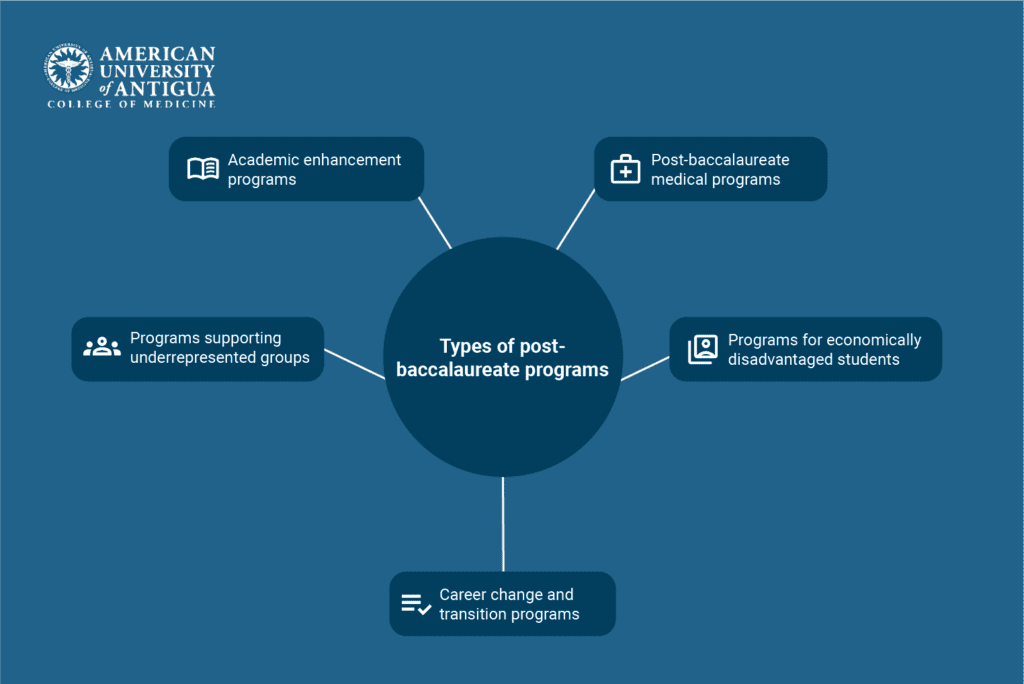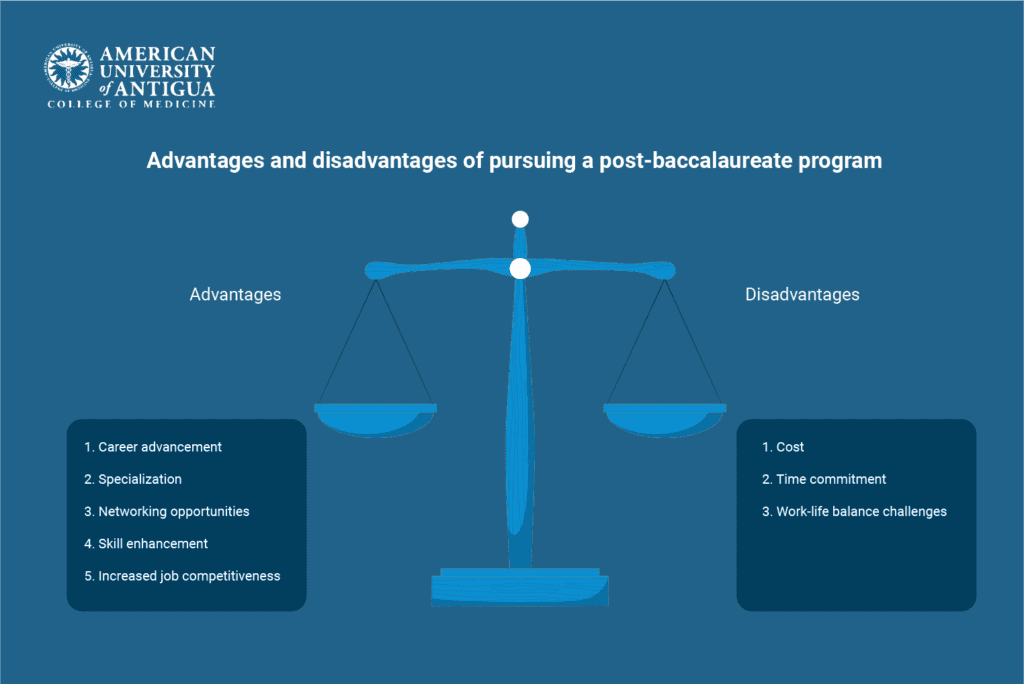What Is a Post-Baccalaureate Program? All You Need to Know
- Post-baccalaureate programs offer specialized education after earning a bachelor’s degree to deepen knowledge or shift careers.
- There are various types of post-baccalaureate programs that cater to various fields, including academic enhancement, medical preparation, and career transitions.
- These programs provide advanced coursework and hands-on experience, making graduates more competitive in their chosen fields.
A baccalaureate degree, often referred to as a bachelor’s degree, is an undergraduate degree awarded by colleges and universities after completing studies. Depending on the institution and the field of study, it typically spans three to six years.
What comes next? Once you have your bachelor’s degree, you can continue your education and specialize in a specific area through post-baccalaureate degrees. But what is a post-baccalaureate program? How does this advanced stage of education enable you to expand your knowledge? Does it help you pursue further qualifications or transition into new careers? Read on, and let’s find out!
✅ Request information on AUA's MD program TODAY!
YOUR PATH TO SUCCESS BEGINS HERE
What Is a Post-Baccalaureate Program?
Post-baccalaureate programs refer to the educational opportunities that come after completing your bachelor’s degree. These programs are designed to build upon the foundational knowledge and experience that you have gained during your undergraduate years.
These programs offer a more specialized focus and provide advanced coursework in a particular field. Whether it’s to deepen your understanding of a subject, gain specific skills, or make a career transition, post-baccalaureate programs are the obvious next step to advanced professional or academic goals.
Different Post-Baccalaureate Programs

Once you earn your bachelor’s degree, then, you can choose from several degree options in post-baccalaureate education. Each program type is designed with a different goal in mind. The most common types include:
Academic enhancement programs
These programs cater to those looking to further enhance their academic records before applying to graduate or professional schools. They focus on providing additional coursework in areas relevant to the student’s interests or future career.
Academic enhancement programs are ideal for all those needing to improve their GPA or gain additional qualifications in order to meet specific program requirements. By completing such a program, students can increase their chances of acceptance into competitive graduate programs.
Post-baccalaureate medical programs
Post-baccalaureate medical programs are specifically tailored for students looking to pursue a career in medicine after having completed their bachelor’s degree. These programs are designed to help students prepare for medical school by providing additional coursework in medical-related subjects.
They’re often a sort of prerequisite for students who didn’t complete the necessary pre-med coursework during their undergraduate studies or those looking to strengthen their application before applying to medical schools.
Programs supporting underrepresented groups
There are also some post-baccalaureate programs designed with underrepresented groups, such as minorities or those from diverse backgrounds, in mind. These programs support and provide opportunities for these students to receive mentorship, academic support, and resources that can help them succeed in their chosen fields.
Such programs aim to increase diversity in higher education and professional sectors. The goal is to level the playing field for students who may face systemic barriers in their education or career advancement, something that, unfortunately, is still an ongoing issue.
Programs for economically disadvantaged students
These post-baccalaureate programs are geared towards students who come from low-income backgrounds and may face financial barriers to further education. They provide financial assistance, academic support, and resources to help students succeed in their educational pursuits.
Such programs aim to ensure that economically disadvantaged students have access to the same opportunities for advanced education and career advancement as their more affluent peers.
Career change and transition programs
There is also the option to pursue specific post-baccalaureate programs focused on career changes and transition. Such programs are designed for people who want to shift to a completely different field. They often provide the foundational knowledge and skills needed for that new profession.
So, whether you’re interested in transitioning from business to healthcare, from humanities to technology, or something else, career change programs offer a way to retrain and gain expertise in a new area. It makes it much easier for you to enter and succeed in a new job market.
Post-Baccalaureate Program Requirements
Post-baccalaureate programs have different admission and completion requirements, depending on the program and the institution offering it, much like bachelor’s degree programs do.
However, in general, most programs require applicants to have a completed bachelor’s degree from an accredited institution. Some programs may also have particular prerequisites, such as a certain minimum GPA, specific courses completed, or some other requirement relevant to the field of study.
For example, a post-baccalaureate medical program may require that students have completed certain science courses, such as biology or anatomy, during their undergraduate studies.
Additionally, it’s common for programs to ask for standardized test scores (like the GRE or MCAT, depending on the field), letters of recommendation, a statement of purpose, and possibly an interview.
Duration and Structure
Post-baccalaureate programs can also range in duration. It all depends on the program type. Some of them, like academic enhancement or career transition programs, may last anywhere from a few months to a year. Others, such as medical programs, may take one to two years to complete.
The structure of the program itself can also vary. While some post-baccalaureate programs are primarily coursework-based, others may include internships, clinical placements, or research opportunities to equip their graduates with experience in the field, too.
Programs are often flexible, with options for full-time or part-time study, online or in-person courses, or a combination of both, which allows students to choose the format based on their needs.
Advantages and Disadvantages

Pursuing these programs has certain benefits, but there are also some drawbacks—or rather, factors—that you should consider when making your choice. Consider each one carefully and see which side tips the scale.
Advantages
The first advantage to pursuing a post-baccalaureate program is the opportunity to learn. If you’re pursuing an academic enhancement program, then you can look at it as a specialization in that area. Similarly, if you’re thinking of pursuing a post-baccalaureate medical program, then you will be learning more about the field you’ll be specializing in.
The knowledge and the skills you gain through such programs will help make you more competitive, whether it be for the competition of joining a graduate program or the job market directly. Moreover, the experience of furthering your education and refining your skills can also lead to personal growth.
As mentioned, post-baccalaureate programs also help you advance in a specific field or transition to a different one. Therefore, they provide the qualifications and credentials needed to climb to higher positions or open new career doors altogether.
All programs offer opportunities for you to connect with others—professionals, mentors, and peers in your field. This way, these programs also help expand your professional network, which is crucial for any career.
Disadvantages
Although the benefits do outweigh the costs for many, it’s still worth mentioning that post-baccalaureate programs can be quite expensive. In fact, tuition for higher education in general has become hard to bear for many. Data shows that tuition inflation has risen at a faster rate than the cost of housing, medical services, and child care, among other areas. So, it’s difficult for many to afford it without being covered by some type of financial aid.
In addition to money, these programs also require a significant amount of time and overall effort. Although they’re generally shorter than most graduate programs, it can still be difficult to commit to it for those balancing other responsibilities, such as work or family.
Career Paths
More career options are available to you through post-baccalaureate programs than with a bachelor’s degree alone. However, the exact path depends on the type of program you pursue.
If you go for a post-baccalaureate medical program, then, obviously, you will have better access to healthcare-related roles or other programs that will lead to those roles. On the other hand, if you focus on a transition program to business, then you will be gaining the skills necessary to pursue roles in business, administration, management, and other relevant areas.
Many post-baccalaureate programs also focus on technology fields. They’ll be the ones to equip you with skills in areas such as computer science, data analysis, cybersecurity, or software engineering. This can lead to roles in tech companies or startups.
Conclusion
Post-baccalaureate programs present an excellent opportunity for students to enhance their academic qualifications so they can continue to graduate school or transition to a new career. Although it’s always wise to take some time and consider the time, costs, and personal aspirations, the truth is that the potential benefits of such a program make it an attractive option for many.
If you’re interested in medicine, then AUA’s preclinical sciences program is the perfect option for you. With an interactive curriculum that emphasizes case-based and problem-based learning, you’ll gain essential knowledge as well as develop key clinical skills that will serve you throughout your medical career.
So, join us and benefit from a program that’s as dynamic as the medical field itself—perfectly balancing theory and practice.
Frequently Asked Questions (FAQs):
Is a post-baccalaureate the same as a master’s?
No, they are not the same. Although they both involve advanced study after a bachelor’s degree, post-baccalaureate programs are typically shorter, more focused on specific skills or certifications, and may not culminate in an academic degree like a master’s.
Is a post-baccalaureate worth it?
A post-baccalaureate program can be worth it as long as it aligns with your career goals, especially if you want to improve your qualifications, transition to a new field, or gain specialized knowledge.
✅ Request information on AUA's MD program TODAY!